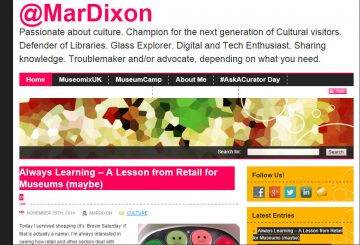 Introduction:
Introduction:
By curiosity and attention, we can bring new ideas and fresh air for our own subject. This month, I suggest you to read the interview of not a professional who works only in the cultural world (eh! he needs living!) but who has already worked inside: Fabien Grenet, founder of Haikusages and business and social innovation entrepreneur.
Can you define what is to work in the social innovation?
I don’t know if we can speak of social Innovation “sector” neither say “I work inside the social Innovation” but I am persuaded that everyone can have a positive impact in society (or at least try to) or societal in its own projects.
For me, working in the social innovation sector is seeking to design new answers to social or societal needs poorly contented or not satisfied at all thanks to creativity, technological advances, cultural evolution, gathering in communities of interest, testing, design thinking or service design teaching, …
For me, working in social Innovation field it’s also keep in mind the concept of societal/social sustainability and scaling up (project ability to reach the largest number of people without turning into labyrinthine system). Another point really important: work from the beginning of the project with all the engaged actors of the project (partners, recipient, final users, …). Crowd Funding is a good example to finance students projects (I carry the eduklab.com project for example). Another example of using technology to answer to one societal problem: web can be used to facilitate neighbourhood connections and help the emergence of local projects as in peuplade.fr that I carried.
What are the limits that you often meet?
 A resistance to change and the “it will never work!” syndrome. This is not specific to social innovation but these arguments are often used and rein in projects.
A resistance to change and the “it will never work!” syndrome. This is not specific to social innovation but these arguments are often used and rein in projects.
Often, we are asking to “change” the actors way of working, doing, thinking and sometimes challenge their fundamentals; this point asks a deep and intensive work of support, acculturation and training … but above all they need a proof by example that these changes are useful and relevant.
I feel that the “it will never work” syndrome is very French and linked to the failure fear. But, often, work step by step helps to outstrip this difficulty; that is exactly one of the fundamentals of the social innovation: have the possible closest relationship with actors to experiment and constantly adapt.
A final point is the mobilization of enough enthusiastic motors in the project because they are real support about the interest and the relevance of the project inside teams… without them, it is hard to launch anything. But this point is true in every kind of projects so I don’t take it as special difficulty.
According to you and your experience, what are the keys to instil innovation, collaborative and start-up mind into cultural fields?
Ouch, big deal!
I don’t know enough thoroughly the cultural sector to bring the best advice but generally the basic is letting go. To innovate, we have to accept asking questions without every time compare them in regarding of what already exists and changes can result because it is quite impossible to give an innovative answer without questioning the current situation. For example, in the museums world, digital innovation forces to rethink the way of seeing works of art and copyright. First, offer to the largest audience high definition artworks of the Museum collections could seem a bad idea because visitors can not come again inside the museum, the reproduction sells shut down by the private prints, …  but it is exactly what the Rijksmuseum and its RijksStudio is doing: offer the best quality to print the Milkmaid of Vermeer in a real size poster, sticker or car deco or on your smartphone. Finally, we see that it is a good idea because it promotes culture and reaches more people who, then, can wish to go in the “real” museum because curiosity was fed.
but it is exactly what the Rijksmuseum and its RijksStudio is doing: offer the best quality to print the Milkmaid of Vermeer in a real size poster, sticker or car deco or on your smartphone. Finally, we see that it is a good idea because it promotes culture and reaches more people who, then, can wish to go in the “real” museum because curiosity was fed.
In a certain way, Museums change of status from custodian of culture to spreader wider culture… that is quite a huge change in their profession.
 About what do you dream?
About what do you dream?
To a world in which everyone can test idea without first of all answer to a lot of questions without any connection with the original idea (as how can I finance this project that deserves time and yet I have to stop working? And if it fails, how can I start up again?, …)
About this last point, I take the “basic income” social innovation to heart that decorrelates partly work and income to allow everyone to access to a use-as-we-want basic income and, of course, complete it by working.
Some links:
Fabien Grenet on medias:
Haikusages :
Social Innovation:




You must be logged in to post a comment.